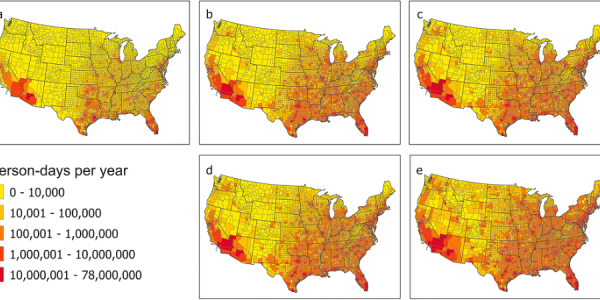Energy Innovation Policy and Technology LLC® is proud to announce that Sonia Aggarwal will become its new CEO, starting in late February.
Blog
Our blogs are accessible under the CC BY license. Users are free to copy, distribute, transform, and build upon the material as long as they credit Energy Innovation Policy and Technology LLC® for the original creation and indicate if changes were made.
Smoke-Ready Communities: Learning To Live With Wildfire Smoke
In order to stay safe and healthy during wildfire smoke events, communities need to understand the health impacts of exposure, know the interventions they can take to mitigate risks, have access to accurate air quality data, and most importantly, have access to clean indoor air. Recent research underscores opportunities to improve smoke readiness across these dimensions.
Water Quality Impacts Under The Worsening Wildfire Regime
Wildfires are increasing in intensity, frequency, and size, decimating ecosystems and devastating communities. As worries about the impacts of wildfires grow, researchers are ramping up efforts to understand wildfires’ water quality repercussions. Studies conducted following the Marshall and Camp fires will help lay the groundwork for future water resiliency efforts and community preparedness.
Energy Innovation® Launches South Korea EPS model, Updates India And Mexico EPS models
Energy Innovation Policy and Technology LLC® has launched a new South Korea EPS model in partnership with the NEXT Group and updated the Mexico and India Energy Policy Simulator (EPS) models. The Mexico EPS was upgraded to the 3.3.1 platform to enable forecasting changes in jobs, gross domestic product, and public health impacts, while India EPS data was updated to account for slower GDP growth resulting from the COVID-19 pandemic.
Human Health in the Age of Climate Change: Disease, Nutrition, and Access at a Crossroads
Studies show climate events can have catastrophic consequences for human health including the spread of disease vectors and contaminated food or drinking water supplies, but new research is identifying ways to reduce the risks.
Energy Innovation® and Innovative Green Development Program Release Latest China Energy Policy Solutions Model
This week, Energy Innovation Policy and Technology LLC® and the Innovative Green Development Program (iGDP) released a new China Energy Policy Simulator with new features including an updated Business-As-Usual Scenario showing the emissions trajectory under current policies, a new macroeconomic analysis module, and an improved industry module.
“Learning” Frontiers In The Energy Transition
How quickly we reduce harmful greenhouse gas emissions critically depends on how fast we learn in the process. New research uses learning curves to explain staggering declines in costs of key climate technologies like solar photovoltaics and batteries, grounding hopes that we can get where we need to go—as long as we don’t delay getting started.
Extreme Heat Is Deadly, Expensive, Inequitable, And Now, More Than Ever, Preventable
As climate change causes more extreme heat days across the globe, heat has become a critical issue for public health and city planning. Recent research illuminates why extreme heat poses even greater health and economic threats than previously thought, but also points to ways we can build effective solutions to address it.
Why People Oppose Or Support Offshore Wind: Distilling The Key Factors That Drive Social Acceptance Of Ocean Renewable Energy
To scale offshore wind, developers and policymakers need to understand what drives social acceptance and how to integrate community values. New research offers insight into the who and why of renewable energy support and opposition, and what specific actions could support a just transition.
New California Energy Policy Simulator Modeling Shows Major Benefits Of Early Action
This week, Energy Innovation released new research evaluating California’s climate progress and identifying a policy pathway that would reaffirm California as a climate leader. This modeling showed the state is off track for its 2030 and 2045 climate goals and must triple its historic emissions reduction pace. Doing so would generate billions in new GDP and hundreds of thousands of new jobs statewide.










